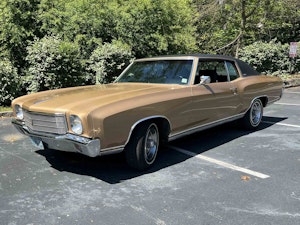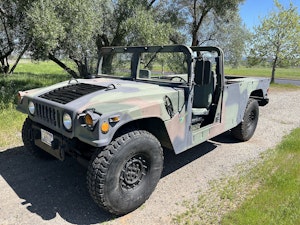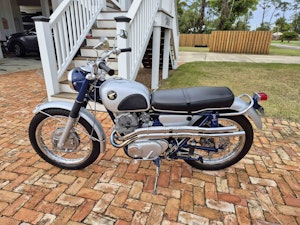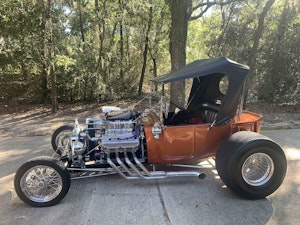Media | Articles
Yard Wealth: How Working on Your Own Cars Is a Radical Act
This article first appeared in Hagerty Drivers Club magazine. Join the club to receive our award-winning magazine and enjoy insider access to automotive events, discounts, roadside assistance, and more.
In 2016, I got a letter from my insurance company, stating that I needed to get rid of the “debris” around my house.
My best guess is that they were referring to the highly sought-after, single-side-cover VW transaxle from the mid-1970s that was sitting under an overhang. Perhaps they also meant the front end, complete from spindle to spindle, that I removed from a donor car and that currently lay in potentia in my carport, awaiting a full rebuild before being transplanted into the Karmann Ghia. Could they mean the body pan rusting along the side of the house, with a perfectly serviceable torsion housing and trailing arms waiting to be harvested? Or the heated leather seats under a tarp, which I spent three hours removing from a late ’90s Audi at Chesterfield Auto Parts (a salvage yard on the south side of town)? Surely they weren’t referring to the roughly 2.6 dirt bikes, two of which needed only a fresh battery and a carb rebuild. At the risk of boasting, I also have an impressive stock of new and scrap metal—rod, flats, plate, square tubing, pipe, sheetmetal, and a few solid billets—all nicely collated by shape, size, and type of alloy.


On my rides through rural Virginia, I see yards where old appliances, ATVs, furniture, and all kinds of crap are not strewn but obviously arranged in front of the house and carefully mowed around. It looks like a yard sale, but it is not. What is it, then? It is something universal, apparently. Dutch historian Johan Huizinga reports that among the Trobriand Islanders, “foodstuffs are not valued solely on account of their usefulness, but also as a means for parading wealth. Yam-houses are so constructed that one can compute from outside how much they contain… The best fruits are the most conspicuous, and particularly fine specimens are framed, decorated with paint, and hung up outside the yam-stores.”
My house is situated such that my yard wealth is not visible from the street, and I have placed it mostly out of sight of my immediate neighbors (because I am neither a Trobriand Islander nor an ostentatious redneck). I’m not sure what the zoning laws are, but for sure the general vibe here, on the West End of Richmond, is more uptight than it was where I lived previously, on the Southside. There, many people had project cars. While the toddlers and their mothers socialized on the sidewalk, the neighborhood social life of the men took place mostly in the unpaved alleys between streets, where the sheds and garages abutted. Everyone knew who had a sandblaster, who had welding equipment, who had a metal lathe, who was especially good at diagnosing electrical gremlins, and so on. There was a good informal economy of favors done and six-packs delivered. My next-door neighbor was a cop. We absolutely hated each other but regularly found ourselves in this kind of interaction.

In my new neighborhood, the lawns are meticulous, the houses are much farther apart, there are no alleys or sidewalks, and recycling is taken very seriously. An outdoor inventory of used auto parts is not part of that equation. Somehow, I gather, a $40K hybrid SUV getting 31 mpg—and the intercontinental energy and material flows that brought it into being—are more “green” than a ratty-looking old Volkswagen assembled from castoff parts, foraged locally, that gets 32 mpg. There is a certain aesthetic of cleanliness that must be adhered to. Better yet, invisibility. To count as green, those ugly chunks of rusting 1970s steel would need to be removed and recycled: melted down in a coal-fired blast furnace and sent across an ocean to become raw material for, say, an electric car, to be returned to the U.S. on a diesel-powered container ship. Such details are best kept out of mind; the main thing is that this journey accomplishes a moral cleansing of the metal.
Marketplace
Buy and sell classics with confidence
My insurance inspector might have also been offended by some items along the side of my garage: A bucket of waste oil, a handful of dead batteries, a cashew container full of used brake fluid, and red plastic cans of gasoline in various flavors (two-stroke mix for the lawn and garden equipment, gas that is too far gone for internal combustion but still useful for starting bonfires, and some fresh, premium stuff). Plus a can of kerosene that I use for cleaning parts. Depending on when he came snooping around, there may have been a yogurt container of half-evaporated epoxy primer, because letting it evaporate and then taking the solid remains to the dump is the prescribed method for disposing of it. Would my insurer prefer that this volatile stuff—filthy and apparently haphazard but in fact carefully tended for use, reuse, alternative use, or disposal—be kept inside the shop, in closer proximity to the welding and grinding sparks?
Nobody wants to live next to a Superfund site; I get that. My point is that our judgments of “responsibility” get clouded with aesthetic considerations that are in turn wrapped up with class-based forms of self-regard and virtue signaling. Zoning laws, as well as the informal norms of bourgeois environmentalism, serve to maintain social demarcations (and with them, wildly divergent property values). They also enforce the planned obsolescence that our economy is based on.

People who work on old cars, whether as enthusiasts or out of necessity, are out of step with this regime. Maybe that’s why we tend to have the secret pride of the dissident: Someone with an alternative frame for making sense of the world, one that allows him to see the value in things that are commonly despised.
Superficially, litter and the rusting carcasses of salvaged cars are both an affront to the eye. But while litter exemplifies that lack of stewardship that is the ethical core of a throwaway society, the visible presence of old cars represents quite the opposite. Yet these are easily conflated under the environmentalist aesthetic, and the result has been to impart a heightened moral status to Americans’ prejudice against the old, now dignified as an expression of civic responsibility. Car people tend to see through that.

Prejudice against the old goes deep in the American psyche. Alexis de Tocqueville reported his conversation with an American sailor in 1831: “I ask him why the vessels of his country are constituted so as not to last for long, and he answers me without hesitation that the art of navigation makes such rapid progress each day, that the most beautiful ship would soon become nearly useless if it lasted beyond a few years.” Here is a striking defense of shoddiness as a natural corollary of the faith in progress.
You don’t have to be a reactionary to see that the idea of “progress” does a lot of mischief in the world. To be skeptical of progress is to have what Michael Oakeshott called a “conservative disposition.” He wasn’t talking about a political ideology. More like an attitude. The conservative, in this sense, doesn’t automatically defer to those who claim to speak for the Future. But neither does he hanker after an imagined past. Rather, he lives more fully in the present: He wants to take care of the stuff that already exists, because he sees the value in it. This is a posture of gratitude and repose in the world as it is, rather than restless pursuit of optimization and novelty. It is a happy place to be. And yes, it tends to require parts cars. Sorry!



***
Matt Crawford is the New York Times bestselling author of Shop Class as Soulcraft and, most recently, Why We Drive.




















I read this in the magazine when it came out, and it’s been one of my favorite articles. I’ve now been using the term “yard wealth” myself, but I’m not sure other folks in my household and near me are as amused by the term.
I’m on board with you, Jeepcj5. That last paragraph is perfectly written to describe much of my own feelings. It’s funny that people will buy nostalgic pictures (and calendars) of old leaning barns, rusted farm equipment, broken gates, and derelict cars to hang on their walls, but will get all up-in-arms if someone doesn’t manicure their property to the nth-degree.
So True!
If there is a car out in the wood and there is no one around to complain does it make an offence. No.
If you had photos to go with his story about the tagested house we could pass better judgment.
Look you have to blend with the area you are in. Some you can trash up all you like, some God forbid you park in a driveway over night.
Where I live we are rural and we have space but it is not an area where rusting car hulks will be tolerated for long periods of time. If you need parts get them off and move the car out..
The guy across the street from me moved in 30 years ago and brought a unassembled 1956 Crown Vic with him, It still sits in the garage with nothing done in 30 years. That is not a problem but the parts car in the drive was a problem. He had to buy a shed to store it in. That was the right thing to do if you are not planning to do anything. The car is so bad now I am not sure what parts are any good.
Might note today Insurance companies are using google earth to look for reasons to cut your insurance off. Trampolines, Trees hanging over homes etc. It is a never ending game. Add in the HOA that are even worse.
Generally as long as you are adapt to the area and show repset and not leave cars abandoned for long periods you will survive.
I keep all my stuff inside. I was lucky to have a building large enough to hold my needs.
Now the new problem in many areas is the parking. In high cost home areas the homes may be a home for 3 generations. Kids are not able to buy a home and then they have kids. This can leave 7-8 cars in the drive or yard. Across the street where the 56 is they have a new Alfa in the front yard. often as they have used up the drive with kids still living at home. This I Suspect will be the next target for many zoning laws.
Love the quote from Alexis de Tocqueville. You are a man of more, or possibly deeper, reading than I, but the quote does say a lot. I am a fan of Creative Destruction, but I’m not married to it; as a constant for a positive society. I don’t mind new things, but I’m not inclined to buy new, just because it’s new. I appreciate a lot of old things, including cars and other machinery. When I look at an apple peeler (or other machinery) from the 19th or early 20th century, I like to wonder about the people who engineered/designed it, and what drove them in that particular direction? What problem were they solving, what guided their ideas and choices? I’m a Troubleshooter, by temperament and as a living. I find when I’m trying to figure out the problem, it often helps me to put myself in the shoes of the builder or designer to understand how a problem might be best solved.
In many ways it might be that I love the information, that I glean from solving these problems, because I can file it away and use it again in the future on some other project.
Basically, the Past informing the Future. To and extent a bit of closing the circle. So, I say show me the past, so I can envision a better way to do similar things in the Future.
I also remember a quote about those who don’t remember the past will repeat the mistake in the future…
“Those who cannot remember the past, are condemned to repeat it.”
― George Santayana
“We learn from history, that we do not learn from history.”
― Georg Hegel
Santayana wasn’t referring to pack-ratting.
Thank you! Mikey.
No offense but if an insurance company isn’t paying my rent or my house note, they have no business telling me what’s clutter or debris around my home, especially if the so called debris isn’t a safety or a fire risk.
Unfortunately, it isn’t about what YOU think is their business that counts to them, it’s what THEY think is their business.
I get the intention of wanting to hang in to SOME equipment or ‘A’ to get back to running or restoration. But a great many number of other things literally made no sense to actually hang in to. Not only is is really just a waste of space and scrap metal money just sitting there, it is hard to justify logically that old harvester from 80 years ago. Spare parts, complete teardown to get running again. It’s inefficient and possibly even quite dangerous compared to new equipment. Scrap it. What possible use could you have in a dishwasher that is 40 years old??? Scrap. I’m not talking about that Studebaker you show actual progress on and your sole project. But to have 8 cars in the property 5 of which are us deplorable shape of no use is merely lazy and eye sores.
Insurance companies are now using drones to inspect properties….
I’d dump that Insurance Company in a heartbeat.
👍🏼
You may find that you’ll run out of insurance companies in a fairly short time.
Well said. I’d say that there’s a huge difference in aesthetics between old but inactive vehicles being lined up in orderly fashion as opposed to being haphazardly littered about, and the same for parts, which should be sheltered anyway. Organization is always preferable to piles, whether it’s building materials or anything else.
This is just an exceptional article. Very well written, and I can certainly relate to it.
Thoughts written on a computer, sent by internet to other computers for people to reply by internet for other computer users to read. Using progress to complain about it.
I’d like to see an air cooled VW get 31 mpg. They get in the low to mid 20’s… which was quite good in the day.
Ummm…. I recollect my girlfriends- now wife – bug getting 30 or better mpg … even with gas at 38 cents/ gallon, we watched the gas gauge carefully!
I got over 30 mpg highway with my 1965 Type 3 Notchback with a single port with stick Dual carbs.
As much as I hate to write this, insurance companies are private entities that we contract with, and they hold the power to cancel. Private individuals don’t have much power, but we do have recourse.
Our insurance commissioners supposedly have our backs, but I also depend on my state and national reps to help out when insurers overstep. I have written to each when I needed help in a situation, and I have received help in both health and property insurance problems.
It behooves us to share our stories with our rep agencies and ask for their help. Believe it or not, they often will.
I’m a car guy but I have to agree with those who don’t want to see a bunch of junk sitting around their neighbors’ houses. I live in an unrestricted, mostly rural neighborhood on a few acres and run a small auto repair business with a few old cars of my own but I keep the junk from piling up because I don’t want to look at junk and neither do my neighbors. If the floor pan spoken about has usable parts, then remove the parts, store them out of sight and get rid of the junk. And there’s no excuse for the used fluids and junk batteries to be just sitting around. Especially these days when a battery core is worth about $20. I’m no tree hugger but this is hazmat. Besides being an eyesore, junk cars and parts can accumulate rain water and be a breeding ground for mosquitoes. Also a hazard for the neighbor’s kid that has no business on your property but goes there anyway to look at the junk. Do you want to fight a liability claim if the kid gets hurt? Juries will look at your yard and see how a kid would be attracted to it so place you liable as if you invited them in. Point is, respect your neighbors. Your junk, even out of sight from the street can bring down property values of everybody’s property and that makes for hostile neighbors who are otherwise docile. If you have a parts car in a neighborhood where others can see it or try to keep a personal salvage yard, rent a storage space in a commercial area or move to a rural area on a tract of land where this is more acceptable. And just remember, as land becomes more developed, having people store old cars and parts along with other junk is the reason cities and counties start writing restrictive laws about what you can keep on your residential property. This is why there are HOAs. And this is why some cities will not allow an unlicensed vehicle to be outside on your property. Accept it or not, hobbyists often do it to themselves.
Please share who is paying $20 for battery cores. Best I can get is about $6
Man, there’s always someone who will douse a perfectly good rant opportunity by giving logical, reasonable, factual, well-written thoughts on a subject. You, Tim, are that someone. 👏
I hate HOA’s. They attract the uptight do nothings who want to have some power over others.
You can keep your HOA’s and manicured lawns. Used to work with a guy that cut his grass every 3 days. Put all kinds of fertilizer and weed killer and who knows what on his lawn. His lawn looked like a golf course. I cut my grass about once a week and don’t do anything to it. Looks good enough and not putting chemicals in the ground. No project cars or anything outside except my utility trailer. Try to keep everything in garages. Stuff melts down over the years if you park it on dirt where I live and eventually becomes scrap